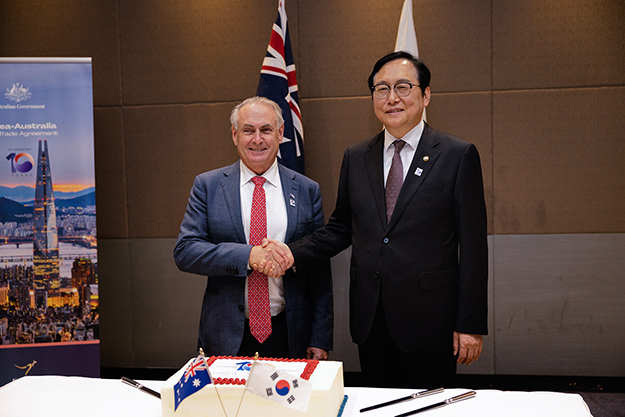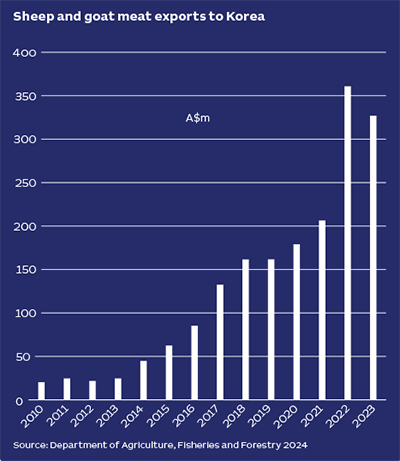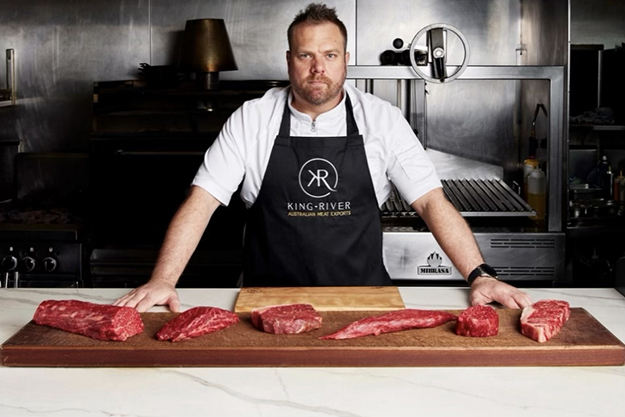The Korea-Australia Free Trade Agreement (KAFTA) has significantly liberalised trade with Australia’s fourth largest trading partner and strengthened the bilateral trade and investment relationship. Since entry into force in 2014, two-way trade has more than doubled from $33 billion in 2013 to $71 billion in 2023. The Republic of Korea is Australia’s third largest export market with exports including coal, natural gas, iron ore, crude petroleum and beef. Australia ranked fourth as an import destination for Korea in 2023.
14 December 2024 marks the 10-year anniversary of KAFTA.
On 3 September 2024, Senator the Hon Don Farrell, Australia’s Minister for Trade and Tourism and the Republic of Korea’s Minister for Trade, Dr Inkyo Cheong, co-chaired the sixth KAFTA Joint Committee.
Ministers celebrated KAFTA’s 10-year anniversary since entry into force and discussed opportunities to fully utilise KAFTA to address new and emerging issues of bilateral interest including in digital trade, green economy and energy and critical minerals.
Agrifood sector
Appetite for Australian agrifood products continues to grow, with Korean consumers eager for good quality, nutritional products from a reputable country of origin. KAFTA has been a winner for this sector with the removal of high tariffs on meat, seafood, horticulture, and packaged food and beverages.
Agriculture
Trade in agricultural goods (agriculture, fisheries & forestry) between Australia and Korea has more than doubled in the last decade, growing from $2.4 billion in 2013 to $5.6 billion in 2023.
Services
Korea is a significant services market for Australia, with two-way trade in services worth $3 billion in 2023. The transport, travel and financial services sectors ranked as top export sectors.
Investment
Korean investment in Australia was valued at $29.3 billion in 2023, making it Australia’s 19th largest foreign investor. Australian investment in Korea reached $30 billion in 2023.
Sheep and goat meat
Sheep and goat meat have seen exceptional growth under KAFTA. Australia supplies 96 per cent of sheep meat and 99 per cent of goat meat imports to Korea.
The gradual elimination of tariffs and the increase in consumer demand for healthy alternatives have steadily increased goat meat exports to Korea.
| Year | Sheep and goat meat exports to Korea |
|---|---|
| 2010 | $20,317,700 |
| 2011 | $24,643,100 |
| 2012 | $21,697,700 |
| 2013 | $24,613,200 |
| 2014 | $44,726,500 |
| 2015 | $62,482,800 |
| 2016 | $85,280,800 |
| 2017 | $132,476,000 |
| 2018 | $161,545,000 |
| 2019 | $161,666,000 |
| 2020 | $179,018,000 |
| 2021 | $206,346,000 |
| 2022 | $360,805,000 |
| 2023 | $326,955,000 |
Source: Department of Agriculture, Fisheries and Forestry 2024
King River – Australia’s finest Wagyu beef
Beef is now Australia’s largest agricultural export to Korea, worth $1.89 billion in 2023, having doubled from $941 million in 2014.
Queensland business, King River is one of the companies that has benefited from the sustained growth in agrifood exports to Korea. King River is a fifth-generation family-owned business with over 200 years combined experience in beef production. In the last 12 months, King River has sent $1.5 million worth of Wagyu beef to Korea. Josh Rich, King River’s General Manager said, ‘with the Korea- Australia Free Trade Agreement progressively removing the 40% tariff, Australian beef is now an attractive option for Korean buyers.’




